Dennis Perrin's Blog, page 4
June 12, 2012
Miles To Go

When I think of all my reckless driving, it's amazing I'm still alive.
It was worse when I was in the Army. I drove a lot during those years. A 1973 Mercury Monterey. Faded green. No front grill. Left headlight tied into place. Eight-track player. Lap-level seat belts. Not that I wore them.
Other than an occasional beer or a slug of cheap wine, I didn't drink back then. So that was never a factor. Weed, on the other hand, was abundant.
I don't know what it's like today, but the Army I experienced was filled with drugs. Most soldiers did something. I went to parties where officers openly smoked. Acid was popular and I ingested my share. Speed was big with the boozers.
I usually had a fat joint or a few roaches in my car's ashtray. I smoked behind the wheel so often that I got used to driving that way. Considering the wreck I drove and the amount of time on the road, the law of averages should have nailed me. Accident or arrest. Nothing happened. Different era.
When I moved to Michigan, regular driving resumed. Nearly two decades in NYC provided little road time. I had to get my timing back. I didn't anticipate how awful Michigan drivers were.
That first year was a road rage special. Middle fingers. Honking. Tailgating. It took me a few months to adapt, but when I did, I was as nasty as the locals. Falling off the grid didn't help; going back to blue collar work angered me. I fit in better than I knew.
Eventually, I calmed down. More or less accepted my fate. Saw nothing ahead but old age, weight gain, and bleak Michigan weather. I've turned that around, which might provide a lesson for others also lost. But I'm not the preacher type.
My driving has also matured. Blend instead of confront. I no longer drive impaired, save for the mild anxiety I sometimes feel on the open road. Some wild motherfuckers out there. Pushing the limits of life, ours more than theirs. I doubt it's a mad bohemian rush toward nothingness. Anger, frustration, desperation, more likely.
In a few hours I'll hit the road for Michigan, driving through Virginia, Pennsylvania, and Ohio. There's a brief dash through West Virginia, one of the saddest states I've seen. Carved out and discarded developing-world style. Poor people in rusting cars. Crumbling exit ramps. Flyover country in the strictest sense.
I stick to a long-drive strategy of laying low. Not speeding. Not fucking with drivers who beg to be fucked with. There are lots of cops out there. Waiting, hiding, cruising in unmarked cars. I've learned to spot them. Helps kill some of the boredom.
Unlike trains and planes, the police state is limited on the highways. But they're trying to fix that. I'm confident that they will.
So pray for me, or whistle a nice tune, or simply be loving to those you love. If my GPS doesn't catch it, my heart and mind will. Aloha.
Published on June 12, 2012 04:11
June 4, 2012
Ride My See-Saw
Oh for the days of creative PR. I've always enjoyed propaganda, the more inventive the better. Beautiful lies that bind.
But like so much else in this nasty age, propaganda is cheap, obvious. Either we've run out of ideas or we just don't give a fuck. I'm not sure. I know this literal minded approach would make Rosser Reeves gleam. He'd be happy to see his brand of bullshit win in the end.
As far as the election goes, our betters are more literal than ever. They're openly admitting how fixed the system is -- gloating about it, actually. Rubbing our faces in their contempt.
Bill Clinton, gliding through a privileged life, doing pretty much as he pleases, defended Mitt Romney's business past. Said that Romney was qualified to be president. This from a senior Obama supporter.
I laughed when I read that. I can't stand Clinton, but that made my day. I'd shake whatever hand he doesn't jerk off with.
The New York Times' Mark Leibovich wrote a piece about the similarities between Obama and Romney. Their backgrounds. Schooling. Personal traits. Leadership style. There are policy differences, but that's true within an administration.
What we basically have is a duller version of Gore v. Bush. And with no Nader to blame, this system's starkness becomes better defined.
It's left to the partisans to whip up whatever frenzies they can manage. Most of the action appears behind Obama. Liberal scribes are straining to paint Romney as a Palin-like nut. It's a shit gig, but serving power has its price. What's a little boot licking when our envied way of life hangs in the balance?
Foolishly, I followed a link to a group liberal site that's been critical of Obama, but there are some holdouts. One prominent example (for that world) went on an angry, spiteful tear against anyone doubting Obama's greatness.
It wasn't elegant or all that bright, but there was passion; or maybe it was desperation. Hard to tell in all that ad hominem.
You probably know the site, and perhaps the angry liberal. I won't divulge simply because I don't need the aggravation. Seen it. Been it. Done it. I'm trying, with varying levels of success, to lead a more serene life. And I'm sure as fuck not mixing it up over Obama v. Romney.
What I said during last go-round still goes. Only this time with love.
There are others dissecting this lunacy. Glenn Greenwald and Jeremy Scahill are the most astute. It was Scahill calling Obama a murderer on Chris Hayes' cable chat show that riled the president's fans. According to them, kill lists, drone warfare, and targeting American citizens are traditional liberal values.
I agree. Mainstream liberalism sits atop numerous mass graves, creating many more. Why pretend otherwise? Especially in America?
The Obama campaign sure isn't, confident that its brazen endorsement of state terror will win votes. Again, no argument. When your chief demographic is fully in line, you don't need to be clever. It's one area of American politics where honesty works.
Published on June 04, 2012 08:24
May 30, 2012
The Old New
My latest piece at Splitsider recalls The New Show, Lorne Michaels' 1984 sketchfest that flopped after nine episodes. It was a weird show -- first-rate talents producing some baffling comedy. But that was probably intentional, an ironic/meta take on baffling comedy.
Published on May 30, 2012 10:44
May 25, 2012
Jubilee As A Verb

I know: this once bustling space has fallen mostly silent. I've explained why, and the reasons haven't changed. Not that you need or desire an explanation, but still . . .
Work on my written projects continues. Yes, I said projects. They are different yet interrelated. Not twin volumes but familiar enough. More about these exciting developments as news warrants.
I'm currently in Michigan to see my son. After readjusting to city life, suburbia seems deader than ever. At least here. Feels like ten lifetimes ago when I slogged through this world with everyone else. It saddens me to a degree, but also makes me anxious. Michigan put a dent in my consciousness. Whenever I visit I keep expecting another blow to the head.
I haven't fully written about that period of my life. Perhaps at some point I will. It's not a terribly funny story, but then what's funny these days?
As for this space, check in weekly for relatively new content. I'm not abandoning it just yet -- certainly not in this All Important Election Year Ever (Part XVIII). But if you must know what's on my mind between posts, follow my Twitter feed. One hundred forty characters in search of meaning, or at least semi-digested punch lines.
Published on May 25, 2012 09:01
May 18, 2012
Lost In Amber
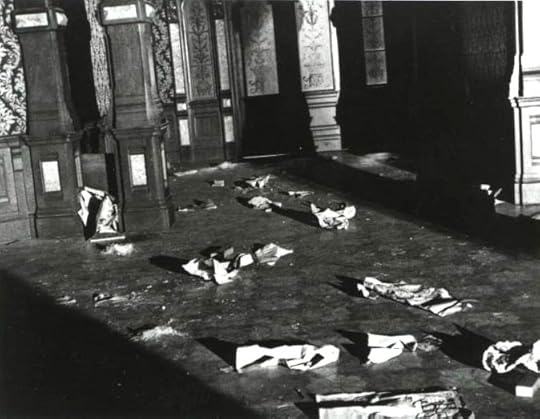
The Magnificent Ambersons faded in fiction as it was mutilated by Hollywood. Orson Welles' adaptation of Booth Tarkington's novel remains an enigma to cineastes, the ultimate What Might Have Been.
A handful of people saw Welles' 132-minute version before RKO slashed it to 88, then slapped on a re-shot "happy" ending. A minor industry has tried to find and piece together the original cut, with few results. What Welles wanted us to see is gone. Only some stills (the above shows the deserted Amberson mansion) remain.
It's a tribute to Welles' talent that the existing cut is as remarkable as it is. I can't think of many films that could withstand what The Magnificent Ambersons did and still be considered classic. RKO assaulted Ambersons, yet it kept moving; its pace compromised but not thwarted.
That experience made Welles appreciate Citizen Kane even more. He had final cut and Kane never previewed. If RKO had its way, Welles was convinced that Kane would have been tarnished as well.
Yet Welles' creative saga is not what attracts me to Ambersons. I'm drawn to its theme of lost time and altered lives. I first saw it in 1980-81 at the Irvington Theater in Indianapolis. I'd seen Citizen Kane, but Ambersons wasn't shown all that much back then -- certainly not in central Indiana. I went with a couple of friends, and as Welles' opening narration took hold, I forgot they were there. I was lulled into a world I knew little about, young eyes wide, eager.
As much as I enjoyed and respected Kane, Ambersons felt deeper, richer. Kane dazzled; Ambersons caressed. Lighting and staging appeared similar, though Welles used a different director of photography for each film.
But Ambersons' scenes gradually unfolded, moving in late-19th century time. You became intimate with the Amberson mansion. Its long dark corridors and winding staircases home to hushed emotions and hurt feelings. The family drifting in shadow and muted sunlight. A cavernous refuge doomed to oblivion. Lives soon to be irrelevant.
The advent of the automobile is considered the main culprit, revealed in this tense exchange at the dinner table:
But cars were merely the harbingers of hated change. Information technology was right behind the gas engine, and as Joseph Cotten's Eugene stated, there was no stopping it. It's pointless to despise the inevitable, much less fear it. Yet you can't escape a certain sadness, or at least I can't. Perhaps my primary current weakness.
And that's the chief emotion I felt re-watching The Magnificent Ambersons recently. Not for the onscreen family, nor for Welles' artistic pain. But for my personal displacement over time.
When I first saw this film, I was 20-21. Filled with ambition, hunger. Ambersons inspired me to do more than just write jokes. It lit my heart while sharpening my desire. I saw it twice more before it closed and thought of ways to approximate its texture in my early work. I didn't come close, but I was too young to be dissuaded.
Watching Ambersons now reminds me of that period. Three decades on and I still feel that ache. My outlook is different, but that young writer remains in me. He had everything in front of him. He was inspired by and absorbed so much. Moreover, he was fearless -- at least when it came to the work.
This is what happens when you reflect on a half-century of life. At least in a reactionary state of mind. It's one area where radicalism not only doesn't appeal to me, it feels like a threat. An aging house crumbling under the weight of time, covered by cheap cement.
Published on May 18, 2012 11:10
May 10, 2012
Got To Let It Show
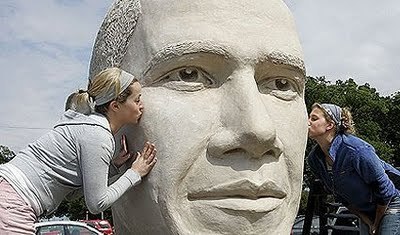
You knew that Obama would toss his long-suffering liberal fans election-year crumbs, and he did, right on cue.
Naturally, his lib fans went berserk with glee, wetting their fingers to catch every speck. Praise unto Our President! they shouted from the floor. History shifts once again!
I don't recall liberals praising Dick Cheney for taking the exact same position on gay marriage. You'd think they'd be more impressed with a oil-soaked reactionary's pro-queer turn.
But no: Cheney remained an evil war criminal who belonged in prison. Who cared what he personally thought about gay rights? His other positions negated that. Fuck Dick and his weak opportunism.
Now comes Obama, saying precisely what Cheney said, only this time the heavens parted, earth trembled, the cosmos aligned in a more progressive direction. It didn't matter that this was Obama's personal, not political, opinion.
Nor was the fact that Obama leaves gay marriage to the states particularly troubling. Indeed, facts meant relatively nothing to the faithful. It was all about feeling, projection, wishful thinking. In other words, nothing's changed.
As with everything he says, Obama's statement was calculated. He conferred with pollsters, advisers, and handlers before taking the Cheney step, knowing full well that his liberal base would come crawling. (You have to love the bit about consulting his "neighbors," as if he was weeding the backyard and struck up a gay marriage conversation with the woman next door while she hanged her laundry to dry.)
He also knows that younger voters overwhelmingly either approve of gay marriage or maintain no strong opinion about it, and that's where the future lies. Older white reactionaries see Obama as a foreign-born Islamo-commie, so nothing he says pro or con will affect their outlook. Plus, that demographic is fading away, which doubtless accounts for their increasingly crazy views. Overall, Obama played it perfectly.
Now, you might point to Obama's murderous foreign policies, his expansion and strengthening of the surveillance state, his aggressive support for the Drug War, his coddling of corporate power, etc., and wonder how his gay marriage stance mitigates all that. Well, it doesn't.
As recent polls have shown, a large percentage of liberals support many of Obama's horrid positions, particularly his increased use of drones (which are coming to a city near you). Obama's reelection image is Warrior President, tougher than Romney, ballsier than the entire GOP. Mix in some pseudo-populist rhetoric, rail against the very corporate forces that keep him in power, play the gay marriage hand right down the middle, and a second term is all but inevitable.
Romney has a lot of work ahead. I don't see how he lines up with, much less defeats, Obama in November. Anything's possible, but Romney doesn't strike me as a come-from-behind maverick. Then again, that's my personal opinion. I'll leave it to the states to decide.
Published on May 10, 2012 05:27
May 2, 2012
Market Zero
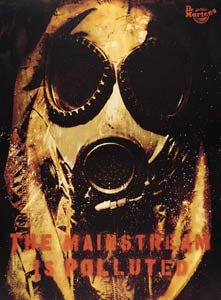
Advertising appeals to the worst in us. It's corrosive, intrusive, toxic. It's ceaseless distraction. It fucks with our frenzied minds.
Advertising is boring. Tedious. Obvious. A piece of processed food you choke on. Swirling debris.
Yet many people can't see a world without ads. Myself included.
I watched the first two episodes of The Pitch, AMC's bid to capitalize on Mad Men's allure. Only there are no Don Drapers or Peggy Olsons, at least so far. The ad people shown are more cogs than creative forces. Wires in the persuasion machine.
Ideally, The Pitch performs a valuable service. It shows how mediocre most ad pros are. Limited vocabularies. Pinched imaginations. Maybe this will dissuade others from entering the profession. Jesus knows that there are more agencies than a healthy society needs.
Then again, I tend to misjudge desire. I'm sure there are young writers watching who romanticize the game. Who want to get paid to make sandwiches dance. Babies talk. Leggy models purr over deodorized spray.
I've seen them. Worked with them. Beaten my head against exposed brick dealing with them. Not that I occupied higher ground. I was in the same room, after all.
Clients share much of the blame. It's an ad cliché that apart from the clients, marketing is a great business. But lovelies, it's more true than not.
American business isn't known for its conceptual acumen or sense of humor. Bottom lines flatten creative appreciation. Clients tend to go for broad ideas that cost them little. In a propaganda culture, they know they must add to the noise.
Yet oftentimes they're lost, confused. This makes them timid, unsure. They'll commit to a certain approach, then abruptly change their minds without warning. Ad creatives, many of whom wing it in the best of times, become gun shy. The process gets constipated, which explains the expressions on ad peoples' faces.
If you ponder why most advertising is awful, that's a major reason. But pedestrian talents on the ad end don't help either.
The Pitch offers a glimpse at this compromised arrangement. It doesn't dig deep. I suppose we should be happy with that. Some of the brainstorming sessions are wince inducing. You wonder how someone so bad gets paid. Then you go online, open a magazine, or channel surf and are immediately reminded why.
The Pitch inspired me to watch Art & Copy, Doug Pray's 2009 documentary about the rise of modern advertising. The older creatives featured speak an alien language compared to those on The Pitch. More colorful. Literate. At times lyrical. They weren't shaped by advertising. They tapped a variety of sources. They gambled with ideas.
Of course, when you interview George Lois, Mary Wells, Hal Riney, Lee Clow, Jeff Goodby and Rich Silverstein, interesting stories and industry insights are guaranteed. But for all of their groundbreaking work, there's a level of rationalization that suggests they understand all too well their societal purpose.
Lois, whose covers for Esquire in the 1960s remain the most iconic in American magazine history, talks a lot about "revolution." How he dragged clients by the balls to his way of thinking. How he despised the establishment and sought to undermine it. And yet Lois helped to bring Tommy Hilfiger to prominence, something he's quite proud of. So it depends on how you define "revolution."
Mary Wells is no less self--flattering. Given her struggles and successes in 60's advertising (she was the mind behind Braniff Airlines' makeover), this is understandable. But when she says, "I think what you can do is manufacture any feeling you want to manufacture. You can create any feeling you want people to have," Wells admits that formulating desire was her chief task. She frames it as a social good, but there's a mercenary angle to her earnestness.
Jeff Goodby, who coined Got Milk?, puts it simply: advertising is "art serving capitalism." Like others of his generation, Goodby poses as the corporate rebel. I'm certain he's sincere, and being extremely successful doesn't hurt. This gives him the freedom to beautify his social role.
If the first two episodes of The Pitch are any indication, we're not going to see the next Lois, Wells or Goodby. I doubt that they exist. The industry has no use for outsized personalities, which should make advertising less attractive. But for semi-ambitious worker bees, cubicle hives tend to be interchangeable. Their discordant buzz our common soundtrack.
Published on May 02, 2012 08:29
April 22, 2012
What We're Made Of
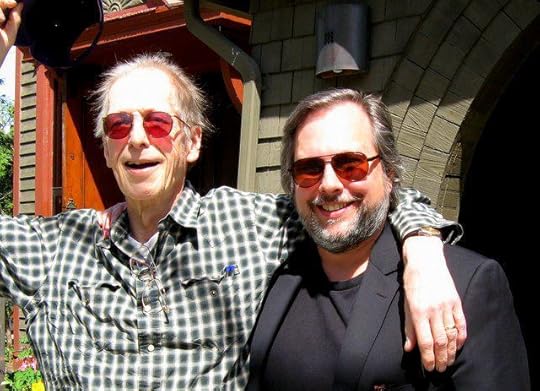
If you know that you're close to dying, how do you behave?
Forget "If this were your last day on Earth" cliches. I mean deep down. Fear. Anxiety. Dread. Acceptance. Resignation. Happiness? Depends on the chemistry, I suppose. When your body is wasting away, your conscious mind must shift. I can only imagine the dreams.
I've been contemplating this since my lunch last week with Tom Davis and Brian McConnachie. Tom, as you probably know, is dying from cancer. He's been sick awhile now, but I really saw it when he arrived at the restaurant.
He mentioned it upon greeting. "I was supposed to be dead six months ago. I don't know what went wrong." Tom smiled as he said this. Brian's eyes looked sad. I chuckled because I didn't know how else to react.
Tom told several jokes about cancer and death. He was often the darker half of Franken and Davis after all. Yet there was an ease to his observations. He displayed no sadness, bitterness, or self pity.
We talked a lot about comedy, today's and the humor of Tom and Brian's generation. They reminisced about their rejected SNL material. How the last 10 minutes of the show was their domain. I reminded them that each had plenty of pieces in the first half hour. But they enjoyed remembering lost concepts and cut sketches.
I can't tell you what being in their company means to me. Especially Tom. I've experienced a major emotional upheaval of late, fighting through depression, digging into the origins of my self-hatred, seeking answers from my past. It's not easy, and there are moments when I collapse from despair.
But there are also positive signs. Revelations to build on. I never expected that The Project would be so personal. For me to get where I want creatively, I must weather these storms.
Then I see Tom. His bravery. His humanity. Maybe imminent death frees you emotionally. Again, depends on the person. I'm sure there are some deathbed assholes. But Tom isn't one of them.
After lunch, Brian and I walked Tom back to his car. A big 70s boat that was the model for the Royal Deluxe II, an ad parody written by Tom and Al Franken, where a rabbi circumcises a baby in the back seat to demonstrate the car's smooth ride. We chatted, snapped some photos, spoke of the next time we would meet. Tom and I exchanged lines from an early SNL bit, then hugged each other goodbye. He felt so frail. But his spirit was bending steel.
I do hope that I see Tom again. He seemed certain of it. But if I don't, I can't think of a better send off. Nor a better model for how to live not only in death's shadow, but embracing life itself. Thanks, Tom.
Published on April 22, 2012 11:05
April 16, 2012
Oyster Brains
Saw The Three Stooges, much of which I enjoyed. I share my musings at Splitsider. Try not to trample each other getting there.
To those who've expressed concern, I'm okay. Just haven't felt like writing blog posts. Maybe I will again soon. Check back to see how this mystery ends. Or is it only the beginning?
To those who've expressed concern, I'm okay. Just haven't felt like writing blog posts. Maybe I will again soon. Check back to see how this mystery ends. Or is it only the beginning?
Published on April 16, 2012 08:57
March 28, 2012
Beltway Drift
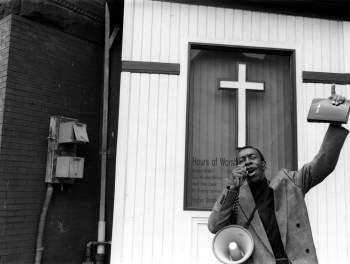
Everyday, usually late morning, the older Black woman downstairs testifies.
"Thank you Jesus! Thank you Lord! Save me God! I feel your power! Yes! Thank you!"
I hear this through much of my apartment, but most directly in my office. Sometimes a taped preacher accompanies her. Most times she's acapella. Like early Christian country music, her prayers soothe me.
There's a storefront Church of God down the street. Praise and singing spill out the open door. Hands clap. Feet stomp. It's a tiny space with ceiling fans, metal folding chairs and hand-painted signs of faith. Passion rocks the sidewalk. I'm not a Christian, but I find this beautiful.
Young white yuppies walk by on their way to the farmer's market. They buy fresh fruit, cheese, bread and meat from hippies in overalls. Organic produce via Maryland. Though only a block from the church, this is a different world. More affluent. Self-conscious. On the rise, wherever that goes these days.
I suppose I'm one of them, but it doesn't feel that way. I'm older, remember pre-internet life, wrestle with savage emotions and moods. The distance between young and old seems greater today. Technology, atomization, the surrender of social life to social media. And yet a lot of these kids glamorize my generation's past. Fetishize the pop culture. Wear its emblems. Maybe everything stopped. All that's left is recycling.
Black neighbors sit on their porches, nod and say hi as I pass. They seem sincere, but you never really know. Given the white invasion, I wouldn't blame them for casting hostile eyes. More likely I'm projecting, an embarrassing, ongoing trait.
It wasn't like this in Michigan. My neighbors kept to themselves, peeking through their curtains. The few I spoke to when my son was in elementary school were rigid and reserved. There was a local pecking order I didn't understand or recognize. Certain parents you couldn't approach without a sponsor. It made me laugh, which extended their distance. In the end, for the best.
The District is a refreshing change. Not my favorite city, but a nice one. At least in the civilian areas.
Giant federal buildings remind you of who holds power. The older ones are less subtle, adorned with Roman colonnades, imperial confidence slowly crumbling. The newer ones, like the DEA/ATF, are streamlined, a fitting symbol for our evolving police state.
When I walk past, I sometimes see people staring back at me through office windows. Do they like their jobs? Do they believe in the mission? To me they look trapped. But then I feel the same way when I walk through midtown Manhattan.
My neighborhood has none of this. Just old brownstones being refurbished as longtime residents watch from their stoops. The middle-aged Black man next door told me that five years ago, this neighborhood was one of DC's roughest.
"You would've been running for your life!" he said, chuckling. Crime is down, though in early morning hours you hear gunshots and loud arguments. Rough areas remain. Judging from the shifting demographic and expanding construction, those areas will be pushed further away.
The local liquor store, run by an Arab family, caters to daytime drinkers who lean against abandoned buildings. They too are sociable, occasionally asking for cheap pint money. I've yet to see another white face in there. The owner, a small thin man with a pencil mustache, brightens when I enter. He's brusque with the regulars, who don't seem to notice or care.
You can't avoid racial issues in moments like that. No matter how shabbily I'm dressed, the owner gives me royal service. I smile, am polite, and quickly finish the transaction. Maybe he remembers more dangerous days. I'm sure I represent an upgrade in clientele.
Recently, two Black teens followed me into that store. When I turned they got right in my face. "Yo man -- you got any money?" asked a kid no older than my son. "Sure," I replied. Dug through my pocket. Felt three loose bills. Pulled one out. It was a dollar. "This good?" The kid took it and said thanks.
The other two were a five and a twenty. But he didn't press for more. The owner went ballistic. "Fuck you! Get out of my store! I'm calling the police!" The teens mocked him in return. "Hey, I thought we was family. You shouldn't talk like that." As the owner screamed obscenities from behind bullet-proof glass, I slipped out and took a long walk.
I don't know if those kids were potentially violent. They could've easily emptied my pockets. But I didn't feel threatened. Maybe my calm disarmed them. Who knows. If I possessed George Zimmerman's paranoia, and his handgun, the situation might have lethally escalated.
Yet I don't think I own my new neighborhood. I still feel like a guest. Hell, I feel like that in much of my life. Guess I always have.
Published on March 28, 2012 09:52
Dennis Perrin's Blog
- Dennis Perrin's profile
- 4 followers
Dennis Perrin isn't a Goodreads Author
(yet),
but they
do have a blog,
so here are some recent posts imported from
their feed.



